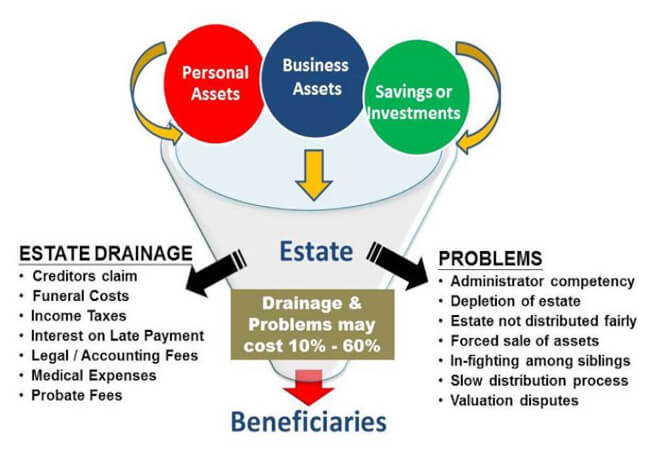What is Estate Distribution ?
Over the years, you have become successful and accumulated assets, businesses as well as investments.
You may heard of the difficulties faced by the family in the process to inherit the assets when a person pass away.
Are these your concerns too ?
- What happens to my assets after I pass away ?
- Who can help me to settle my debts and distribute my assets ?
- What are the procedures for my estate administration ?
- Who should I pass my assets to ?
- How should I keep my asset documents ?

What make greatness is starting something that lives after you. Ralph W. Sockman
What Happens When a Person Passed Away
When a person pass away, the deceased’s estate in the form of assets or liabilities will all be frozen.
Assets can be broadly classified into and movable or immovable assets.
- Movable assets include cash, bank accounts, cars, jewelleries, shares, unit trusts, insurance policies and your Employee Provident Fund (EPF) account.
- Immovable assets are real properties like houses, condominiums, shop lots , commercial buildings or even land.
Liabilities are loans or debts left behind pending clearance. There are 3 broad category of liabilities
- Personal income tax liabilities
- Secure liabilities like bank loans, credit card personal loans, vehicle hire purchase
- Unsecured liabilities like borrowings from siblings, friends or relatives

Immediate Impact to Deceased Family
For working professionals, the death of income earner big impact to the family.
- Source of income stops
- Bank accounts are frozen and cannot withdraw money
- Unit trusts accounts are frozen and cannot redeem for cash
- Car, house, shares are frozen and cannot be sold or transferred
- All loan repayments, bills have to continue to service and pay
For business owners, the death of a business partner has big impact to the business too
- If the business is structured as sole proprietor or partnership, the whole business is dissolved
- For limited liability company, the shares are frozen and suspended pending price valuation
- Deceased family can appoint a substitute person to act as deceased representative in business
- The surviving partners need to service and pay all business loan repayments, bills, expenses
- The surviving partners need to decide whether to buy over deceased shares in the business
The only assets that may not be frozen are insurance policies and money in EPF provided that proper nominations had been made. If there are no nominations, monies from the insurance policies and EPF will also be frozen and channeled into deceased estate as well.
Beside money and business, the next thing in line the deceased family need to worry is to apply for Grant of Probate (where there is a will) or Letter of Administration (where there is no will) from the High Court. This application process is a very time consuming and costly.

Parties in Estate Distribution
Personal representatives
- The appointed parties (persons or corporation) by High Court to administer the estate.
- For estate with Grant of Probate(with a Will), the personal representative is appointed as Executor
- or estate with Letter of Administration(without a Will), the personal representative is appointed as Administrator
Beneficiaries
The rightful recipients of the deceased estate assets
- The custodian or protector for the minor children of deceased family
- Guardians are normally siblings of the deceased
Surety / Guarantors
- The financial guarantors appointed by the High Court to safeguard the estate in a situation without a Will
- Surety / guarantors are hard to find as their money has to be pledged to the High Court for many years and become public records
Guardians
- The custodian or protector for the minor children of deceased family
- Guardians are normally siblings of the deceased

Potential Problems During Estate Distribution
Many issues can arise between beneficiaries and the appointed personal representatives (either Executors or Administrators) who are administering the estate.
These issues are usually circled around money, competence, the sour relationship among siblings, the time to follow through and execution decision.
In-fighting among beneficiaries and legal proceedings complicate the distribution process and deplete the estate faster.
Competency
- The appointed personal representatives may be unsuitable to act in that capacity
- The appointed personal representatives may not undertake and fulfill their duties efficiently
- The appointed personal representatives could siphon money and not behave honestly
Execution
- Estate not distributed fairly or equitably
- Forced sale of personal & business assets to pay off debts
- Family in-fighting with court proceedings in the public eye
Money
- Disputes over the valuation of assets
- Identification of assets which should form part of the estate or how personal effects be distributed
- Payments of expenses such as income taxes, interest on late payment, legal, accounting fees, medical and funeral costs that cause the estate be depleted
Relationship
- Disputes between family members because of sibling rivalry and dominance
- Beneficiaries with ambiguous and contrary beliefs about their rightful role
- Misunderstandings of intent, different expectations, resistance to change or unspoken fears
Time
- Lengthy and slow distribution process
- Misplaced or missing original documents
- Lack of follow up and follow through by the personal representatives
Do you want to see 20-30% of your estate wasted on cost?

Asset Inventory Form
This PFA Exclusive Guide helps you to list down all your assets for the ease of deceased family compilation.
